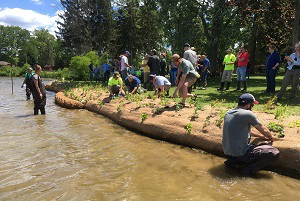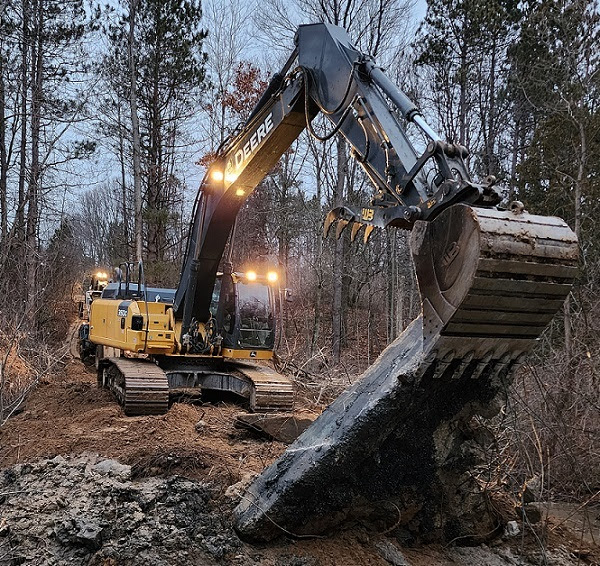Michigan: Revamped DNR Program Offers Money for Fisheries Habitat, Dam Removal

Project preproposals are due Aug. 30
An estimated $1.825 million is expected to be available through a new Michigan Department of Natural Resources grant opportunity that combines three previously separate programs and will provide targeted funding for a variety of activities including fish habitat conservation, dam removal and repair, resource assessment studies and access to recreation.
Joe Nohner, a resource analyst with the DNR Fisheries Division, said the department decided to unite those programs to make it easier for applicants to apply for and receive funding, for efficiency and consistency in grant management, to better incorporate stakeholder feedback and, ultimately, to improve outcomes for natural resources and human safety.
“The new Fisheries Habitat Grant will ensure funded projects are better designed, make it easier for applicants to leverage state funds to acquire additional project funding, and allow us to consider a single application relative to the funding sources for which it is eligible,” Nohner said.
Grant details
The three original DNR grant opportunities – Aquatic Habitat, Dam Management and the Habitat Improvement Account – that merged under the new program no longer will exist separately. The Fisheries Habitat Grant takes the “themes” that correspond to the funding sources and goals of those three prior grant options – aquatic habitat conservation, dam management, and aquatic habitat and recreation in the Au Sable, Manistee and Muskegon watersheds – and offers even more features to strengthen the collective program:
- The ability to potentially apply for and receive funding under all three themes (if eligible) with a single application.
- The potential to seek a commitment for funding from a future year’s grant cycle, which allows recipients to leverage state funding in applications for federal, private or other sources.
- The creation of the Fisheries Priority Habitat Projects list, which identifies projects that will receive preference during application review. Applications for projects on this list still must be competitive in other aspects, including cost, appropriate methods and design, applicant expertise, etc.
- Required discussion of all projects with a DNR fisheries biologist before an applicant submits a preproposal.
Focus areas
Protecting and rehabilitating fish and other aquatic animal habitats are common goals under all three Fisheries Habitat Grant themes, and for good reason.
“Our world-class fisheries depend on quality habitats, but many habitats are threatened by human activity,” Nohner said. “The DNR prioritizes habitat conservation that targets the causes of habitat decline, such as barriers to connectivity, altered water levels or flow, shallow water habitats, and degraded water quality and riparian land – those transitional areas between land and water, like riverbanks.”
Proposed projects addressing the causes of habitat decline might include efforts to:
- Improve the management of riparian land.
- Restore natural lake levels.
- Improve or create passage for aquatic organisms by removing culverts, dams and other barriers.
- Improve water quality.
- Implement watershed-based approaches to improving both the quality and quantity of water.
- Develop projects that demonstrate habitat conservation.
- Restore stream function.
- Add structural habitats, like woody habitat or aquatic vegetation.
- Conduct assessments that will guide conservation projects.
- Complete other projects that meet program goals.
Grant and application guidelines, webinar info
Fisheries Habitat Grant funding is available through an open, competitive process to local, state, federal and tribal governments and nonprofit groups, for single- and multiple-year projects. That funding is derived from:
- An expected $1,250,000 from the Game and Fish Protection Fund, supporting the aquatic habitat conservation theme.
- An expected $350,000 from the state’s General Fund, supporting the dam management theme.
- An expected $225,000 from a hydropower license and settlement agreement between Consumers Energy and several entities including the DNR, supporting the aquatic habitat and recreation in the Au Sable, Manistee and Muskegon watersheds theme.
Available grant amounts start at a minimum of $25,000, up to a maximum set at the total available funding level in all theme areas for which a project is eligible. If necessary, smaller projects within the same region addressing similar issues and system processes can be bundled into a single grant proposal package in order to reach the minimum grant amount.
All applicants must complete and submit a short preproposal for DNR review. Preproposals must be submitted by email to Chip Kosloski at kosloskic3@michigan.gov no later than Friday, Aug. 30. Applicants will be notified of the outcome of their preproposal by Friday, Oct. 4, and if successful, will be invited to submit a full application. An invitation to submit a full application does not guarantee project funding.
The DNR will host an informational webinar from 10:30 to 11:30 a.m. Wednesday, Aug. 7. It’s a great opportunity for interested applicants to ask questions about the new grant program. To register for the webinar, email Joe Nohner at nohnerj@michigan.gov.
The detailed program handbook (including timeline) and preproposal guidelines and forms are available at Michigan.gov/DNR-Grants.





